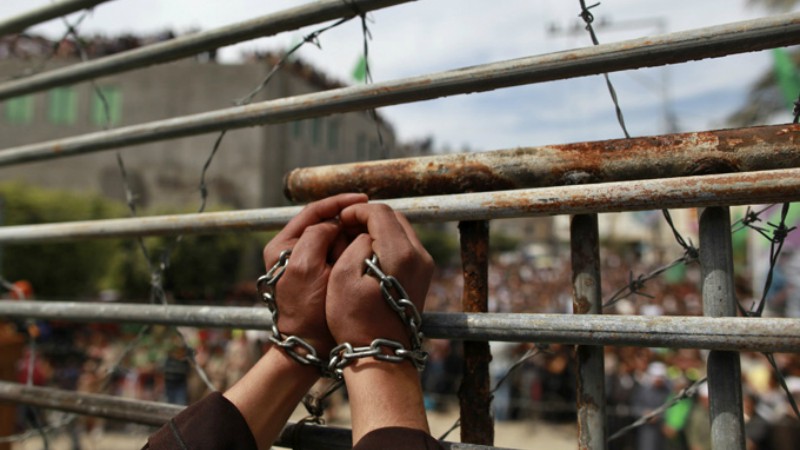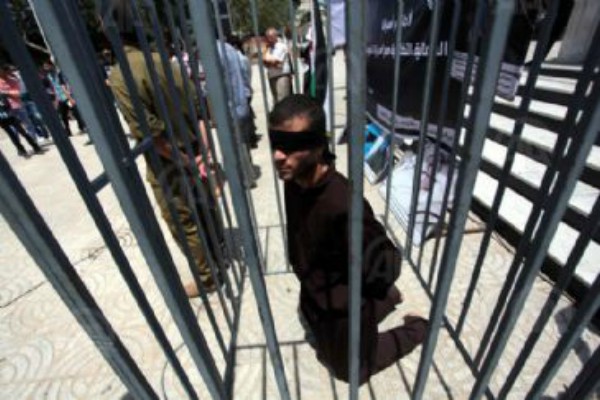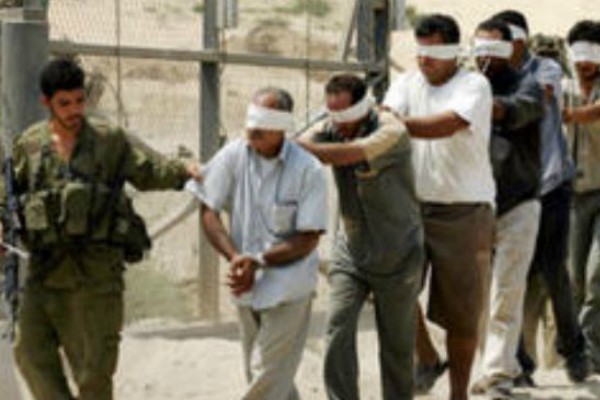
The Palestinian Initiative for the Promotion of Global Dialogue and Democracy strongly condemns Israel’s treatment of Palestinian prisoners held in Israeli jails.
The latest incident is of thousands of Palestinian political prisoners held in Israeli prisons announcing a massive hunger strike. The revolt by more than 1,000 Palestinian political prisoners in Israeli jails began on April 17 raising basic demands for dignity, respect and democratic rights working people around the world can identify with and support. The hunger strikers’ demands include access to public telephones to talk with relatives, twice a month family visits of more than 45 minutes per visit, permission to take photographs with their families, adequate health care, air conditioning and an end to solitary confinement.
The hunger strike, lasted 40 days, ended on Saturday after Israel reached an agreement with the Palestinian Authority and the ICRC after an agreement to increase prisoners’ family visits to two per month.
Marwan Barghouti the leader behind the hunger strike had published an article in the New York Times regarding the problems faced by the jail inmates showcasing the demands of the protestors. The article states him being a prisoner for 15 years and witnessing illegal arrests of Palestinians convicted with confessions under duress. The Israeli government has condemned the article by launching a campaign forcing the editors not to glorify the name of Mr. Marwan Barghouti a convicted murderer and a member of a terrorist organization.

The Israel government is also trying to suppress the media of their own country by not showing the problems faced by the prisoners in Israeli jails. Any newspaper or magazine showing the distress or commenting on the protesters were to be declared as terrorists and jailed for seditious writing. Barghouti will now be prosecuted in a disciplining court as punishment for his article. This shows the obstruction of freedom of speech and expression. He is currently serving five life sentences plus forty years for his suspected role in the murder of Israelis.
The Israeli–Palestinian conflict has its roots in the late 19th and early 20th centuries, with the birth of major nationalist movements among the Jews and among the Arabs, both geared towards attaining sovereignty for their people in the Middle East. The key conflict is of mutual recognition, borders, security, water rights, control of Jerusalem, Israeli settlements, Palestinian freedom of movement, and the Palestinian right of return to Gaza the place where the Israelis have occupied.
The first hunger strike launched in Robben Island 1966, witnessed inmates refusing food for days leading them to collapse due to hunger. This compelled them to address their grievances not leaving them at death’s door. Ebrahim Ismail Ebrahim one the persons who was a part of the hunger strike in 1966, had slipped a note to his lawyer regarding the brutality happening inside the prison. Here although by doing such an act, he was never punished by the Israeli government then why is Barghouti facing trial for his recent activity.
Unfortunately, Barghouti is facing what would seem a far more draconian prison system. Today Barghouti is one of 6500 political prisoners in Israeli jails, 300 of which are under the age of 18, and 536 under administrative detention.

On the other hand, a group alliance by several far-right, Zionist Israeli political parties, came together to “celebrate the hunger strike” and to “break the spirit” of the strikers by barbecuing near the prison, likely expecting that the smell of the cooked food would waft into the strikers’ prison cells. The BBQ participants as “activists,” the far-right Israelis stated the prisoners “will enjoy breathing in the smoke and suffer from the smell of the meat will show them that we will not give in to their whims.”
The question arises that why are they holding the Palestinians responsible for the terrorist activities where they themselves have been bombing Gaza creating anger within the people to take revenge in return for their ill treatment. Some Palestinians also complained of them, they are not allowed to buy houses in other areas which are an indifferent attitude as the government ceased lands, demolished homes and destroyed olive orchards of Palestinians in Gaza. As usual, Israel denies any wrongdoing, invoking “terror” and insisting that Palestinian prisoners are treated “normally and fairly”.
Many of the men confined have expressed their feelings of missing their mothers and daughters. This feeling is divided among their family members by a wall in front of them and with limited visiting time. It forces us to commune with these prisoners as fellow human beings, persons like ourselves with love, needs, aspirations, hopes, pious dreams, and unrelenting hardships and suffering. The world refuses to pay attention to such hunger strikers, which is somewhat shocking despite decades of lectures to the Palestinians to renounce armed resistance, and engage instead in nonviolent forms of resistance, and if they do so, they will win political support for their grievances even from governments allied with Israel, including the United States.
As Socrates, the world renowned philosopher said that we should always ask ourselves questions on whether we are doing the right thing. We should think with our individual conscience on what is morally or ethically correct. What is right in not what God has given us but our own effort which makes us happy and that is what the Palestinians are trying to do?
It is evident that international humanitarian law falls short when it comes to offering suitable protection to the Palestinian people. Rights like occupation and annexation of land is a major phenomenon. These rights need to be exercised in a manner respectful of civilian innocence, but difficult issues of identification are posed in relation to armed and violent Israeli settlers.
Palestinian prisoners are filled with confidence and wisdom in their hearts and thus will not stop the struggle for their rights.





